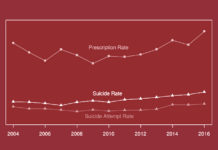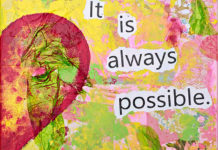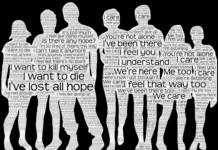Mad in the UK
Today sees the culmination of many months of effort with the launch of Mad in the UK. Acting in concert with MIA, Mad in the UK will carry UK-specific content and provide a voice for UK professionals, service users/survivors, peer activists, carers, researchers, teachers, journalists and others who are working for change in the field of what is usually referred to as ‘mental health’.
Introducing ‘Brainsplain’
I'm excited to be doing a new video project, called Brainsplain, in collaboration with MIA. In these videos, end-users of mental health resources critique the latest psychiatry research. I summarize new mental health investigations, and patients evaluate the significance. They share their hopes for future therapies and for changes to culture, and assess ethical issues raised by the research.
Letting Negative Projective Identifications Come, and Letting Them Go
In the instant I perceive that I’ve succeeded in inducing fear and shame in you, I can feel a palpable relief from my own fear and shame. This process is called projective identification. I gradually learned as a therapist to be aware of when a person seemed to be mysteriously able to create distressful emotional states in me — states that they were themselves subjectively feeling, but weren’t fully aware of.
The Impervious Surface of Professional Help: A Letter to My Therapist
Why is it that members of the community who have no formal education in psychology or counseling or therapy like myself are receiving more training in compassion and effective responses to the public health crisis that is suicide than “professionals?” My coworkers at the crisis center are far less pathologizing, cold and judgmental than those with licenses to “help.”
Adolescent Suicide and The Black Box Warning: STAT Gets It All Wrong
STAT recently published an opinion piece arguing that the black box warning on antidepressants has led to an increase in adolescent suicide.
It is easily debunked, and reveals once again how our society is regularly misled about research findings related to psychiatric drugs. STAT has lent its good name to a false story that, unfortunately, will resonate loudly with the public.
When Rain Comes, Words Are Unnecessary: Our Search for a Better Way
As stories wove together, Ron turned to the son and said, “You know, I don’t think you were ever schizophrenic at all.” There was an extended silence as this statement sunk in and the group drew closer to hear what came next. But the rain fell harder until all sound was drowned out. We sat together, feeling the rain soak into our ears, our bodies, the ground; words were unnecessary.
Why Mainstream Psychiatry is Ableist
Psychiatry offers medication that can only be tolerated by the extremely able bodied. Those who are already physically ill or disabled will be made more and more ill by psychiatry over time, and the field of medicine marginalizes disabled folks by not addressing these issues. Many differently abled people are not aware of how vulnerable their bodies may be to these drugs, and doctors are unlikely to tell them.
Waiting for Gravity
Of course one wishes for an easy answer, but the things that conspire to drive a person over the edge are too numerous and varied ever to point and say, it was this one; one can never really be so certain. No one can say it wasn’t that one, or that it wasn’t really all of those together, or that, when it came my own turn for “insanity,” I wasn’t standing halfway over the edge already, waiting for gravity to kick in and for me to fall.
The Psychoanalytic Struggle Against the DSM
Let us go back to 1975: psychoanalytic psychiatry was then quasi-hegemonic, and psychopathological models were accepted and used by most practitioners; other behaviourist practices were of minor importance and psychoanalysts had learned to make use of the advances of pharmacology. And yet a shadow was already looming over the picture.
Suicides Are Increasing – And So Are Antidepressant Prescriptions
Disturbingly, our study and others reveal that the black box warning is now ignored in many countries, since antidepressant prescriptions for children are on the rise again. Despite increasing certainty that antidepressants are ineffective and likely cause suicidal behavior in young people, psychiatry continues to claim that they reduce suicide risk.
Uncomfortable Relations: Reflections on Learning From Psychiatric Survivors
I increasingly think we can only reach greater understanding by working through our own experiences first, and then, if we can, alongside survivors. That will help us become more open to survivor knowledge. For example, we may need to work through our own need for control and understanding. It’s helpful to consider our own reactions to distress or madness — in ourselves and others.
A Time For Rain: Teaching Our Children About Sadness
The only way out of the epidemic of feeling-people-turned-medicated-psychiatric-patients is to rebrand and reframe feeling as a cultural collective. And I believe it starts with our messaging as parents and our orientation toward shadow elements like anger and sadness. We have to model a conscious relationship to our own dark parts, and we have to show our children what it looks like to move through these spaces. Feelings can be messy, wild, and sometimes ugly to our constrained sensibilities.
Envisioning Psychiatric Drug Freedom
Psychiatric meds can shut down the emotions and consciousness enough to make it possible to tolerate dynamics that would inspire rage or surges of empowered activity without the meds. It can be helpful to look closely at these blocks and start to create a map to freedom, understanding that it is a complex process that involves not only the physiology of the body of the individual taking meds, but the architecture of the social system around that person.
Resistance Matters: The Activism of Don Weitz
I have spent much of the past few years compiling and editing Resistance Matters: An Antipsychiatry Activist Speaks Out, which will document the long and rich activist career of Don Weitz, the grandpappy of Canadian antipsychiatry. Before I met Don in 1986, I thought I was the only person in the world who didn’t believe in “schizophrenia” (with which I had been diagnosed), and who realized that psychiatry was completely bogus.
Prescripticide: A Proposal for Action and a Request for Your Help
The primary factor protecting psychiatry’s unwarranted power and authority is that it is perceived as shielding society from folks who are believed to be dangerous. It would seem, then, that one logical step toward reducing society’s trust in biological psychiatry would be to reveal the evidence of a significant correlation between the use of prescribed psychoactive drugs and the commission of violent acts against oneself or others.
Deadly Serious: Talking Openly About Suicide
The suicide crisis is real. The pain is real. The deaths are real. None of us can afford to stick our heads in the sand and pretend that this isn't happening. But the helplessness and confusion about what to do about it are also real. And that's why peer relationships and peer-developed modalities can be so helpful. Many of us have been there and are still alive to talk about it. We know what ways of relating gave us hope and helped us to continue on.
The Creativity and Suicide of Robin Williams: A Phenomenological Study
My purpose in writing this case study is not to suggest that creativity is a mere byproduct of trauma, or to deny the role of so-called mental illness in suicide, but to situate these phenomena within the context of human lives. To render them humanly (rather than medically) intelligible. With his mind and body disintegrating, Robin Williams took his life to thwart the eradication of self.
Hegemonic Sanity and Suicide
The “good” suicide attempt survivor wakes up in a hospital bed bathed in beautiful natural light, surrounded by the people who love them most, and they realize that their thinking was flawed and all those unsolvable problems can actually be solved if they are just compliant with medication and therapy. And then there's the “bad” suicide attempter who is angry that they lived, who challenges the status quo.
Suicidal Tendencies, Part III: So, When Do I Get to Call the Cops?
What if the key to saving someone is to admit you are powerless to save anyone at all? What would that beckon us to change? A few years ago, I spent a substantial amount of time talking with a man who entered my life because someone in the mental health system told him I might be the one who could save him (or at least, that’s how he heard it). His name was David.
Thar’s A New Sheriff in Town!
As a longtime participant in the conversations here on Mad in America, I’m very excited about taking on the role of moderator for the MIA discussion boards. MIA considers the community discussions to be integral to its mission to serve as a forum for “rethinking psychiatry,” and I am assuming this role at a time that the organization, in response to the reader survey we conducted, is striving to make the discussions more welcoming to all.
Results of the 2018 Mad in America Reader Survey
In June 2018, we ran our first ever reader survey. The purpose of the survey was to gain feedback on what you, our readers, want to read and thus provide helpful suggestions for future content. This update provides a brief review of the results of the survey so far and outlines what actions we will take in response. Thank you to all who responded for taking the time to tell us how you feel about Mad in America.
The Scientism of Childhood and Adolescent Depression
When I was training to be a child psychiatrist in the mid-1990s, childhood depression was considered to be rare, related to adversity, and generally unresponsive to pharmaceutical treatment. Since then much has changed. The psychiatrization of the pain and struggles involved in growing up has caused considerably more harm to young people than good. I believe the science is on my side in this conclusion.
In Defense of Healthy Mania
It is important to distinguish, and not simply pathologize, experiences that are manic-like because they are time-honored states of mind associated with aspiration, ambition, and goal-achievement. The need to generate boundless energy, overtalk the issues to sustain single-minded focus and motivation, and have a somewhat grandiose vision of what can be accomplished, combined, can eventuate in a manic mix of tendencies necessary to bring higher-order goals to fruition.
Can Children Have Bipolar Disorder?
After seeing the family for two sessions I came to the conclusion that what Adam was suffering from was inconsistent discipline, temper tantrums and misbehavior that were inadvertently encouraged by his parents. The correct prescription for Adam was not an antipsychotic medication that might cause him harm, but family therapy to help the parents implement a behavioral program that would fit Adam’s needs.
Ensuring Integrity of Studies: Analysis of the Dan Markingson Case
Dan Markingson was a 26-year-old mentally ill young man who violently killed himself in 2004 while enrolled in a drug-sponsored study of atypical antipsychotics among persons experiencing psychosis for the first time. Highly vulnerable individuals like Markingson should not be taken advantage of in the name of scientific research, and inability to protect such vulnerable subjects compromises the integrity of research.
































